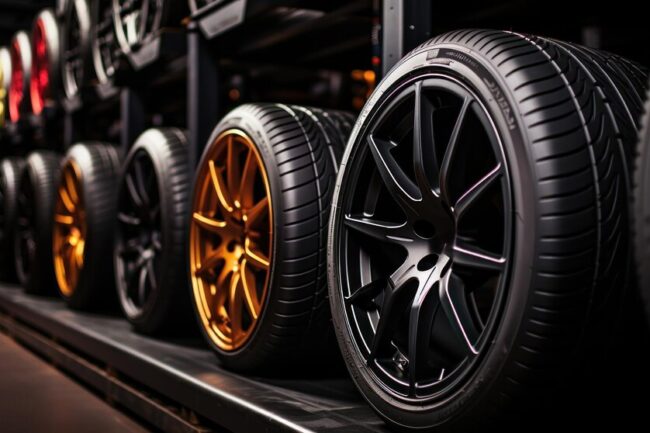Alloy wheels are not just a functional component of vehicles; they are also a statement of style and performance. Their sleek designs and lightweight construction enhance cars’ overall appearance and handling, making them a popular choice among car enthusiasts. However, maintaining alloy wheels’ pristine look and functionality requires proper care and protection.
This guide will delve into alloy wheel protection, providing essential tips and techniques to keep your wheels looking their best and performing optimally. From regular cleaning routines to preventive measures against road hazards, we’ll cover everything you need to know to ensure your alloy wheels roll in style for years to come. Let’s dive in!
Understanding Alloy Wheels
Understanding alloy wheels is essential for car enthusiasts and owners alike. Unlike traditional steel wheels, alloy wheels are made from a combination of aluminum and other metals, offering several advantages. They are lighter in weight, which can improve vehicle handling, fuel efficiency, and acceleration. Alloy wheels also enhance vehicles’ aesthetic appeal with sleek designs and finishes.
Additionally, they dissipate heat more effectively than steel wheels, which can benefit braking performance. Overall, alloy wheels are prized for their strength, durability, and ability to elevate vehicles’ performance and appearance.
Benefits of Alloy Wheel Protection
- Enhanced Appearance: Protecting your alloy wheels helps maintain their original finish, keeping them looking new and attractive. This can enhance the overall appearance of your vehicle.
- Prevention of Damage: Alloy wheel protection measures, such as coatings and wheel protectors, create a barrier against road debris, brake dust, dirt, and other contaminants that can cause scratches, corrosion, or other damage to your wheels.
- Extended Lifespan: Protecting your alloy wheels from damage and corrosion can prolong their lifespan. This can save you money on frequent repairs or replacements.
- Maintained Resale Value: Vehicles with well-maintained alloy wheels are more attractive to potential buyers and can command a higher resale value. Protecting your wheels can help preserve the overall value of your vehicle.
- Ease of Maintenance: Properly protected alloy wheels are easier to clean and maintain. They require less effort to remove stubborn brake dust and dirt, keeping them looking clean with minimal effort.
- Improved Safety: Alloy wheel protection can help maintain the structural integrity of your wheels, reducing the risk of failure due to corrosion or damage. This can contribute to safer driving conditions.
Overall, alloy wheel protection enhances your vehicle’s aesthetics and contributes to its longevity, safety, and resale value.
Importance Of Alloy Wheel Protection
The importance of alloy wheel protection lies in preserving your vehicle’s aesthetics, functionality, and value. Here are some key points highlighting its significance:
- Enhanced Appearance: Alloy wheels are prized for their sleek and stylish appearance, which can significantly enhance the overall look of a vehicle. Protecting them helps maintain shine and finish, contributing to the vehicle’s visual appeal.
- Improved Performance: Alloy wheels are often lighter than traditional steel wheels, which can improve handling, acceleration, and fuel efficiency. Protecting them ensures they remain in optimal condition, supporting these performance benefits.
- Cost Savings: Repairing or replacing damaged alloy wheels can be expensive. You can avoid these costly repairs and maintain your vehicle’s value by proactively protecting it from scratches, dents, and corrosion.
- Safety: Damaged alloy wheels can compromise tire integrity and vehicle stability, potentially leading to safety hazards. Protecting them reduces the risk of structural damage affecting the vehicle’s performance and safety.
- Longevity: Properly maintained alloy wheels can last longer, providing durable support for your tires and contributing to the overall longevity of your vehicle.
Overall, alloy wheel protection is essential for preserving the aesthetics, performance, and value of your vehicle and ensuring your safety on the road.
Common Types Of Alloy Wheels
- Cast Alloy Wheels: These are made by pouring molten aluminum into a mold to create the wheel shape. They are durable and cost-effective but can be heavier than other types.

- Forged Alloy Wheels: These wheels are made from a solid piece of aluminum that is heated and shaped under high pressure. They are lighter and stronger than cast wheels but are more expensive.
- Flow Formed Alloy Wheels (Rotary Forged): This type of wheel is created using a combination of casting and spinning at high speeds. It results in a wheel lighter than cast wheels but less expensive than forged wheels.
- Multi-Piece Alloy Wheels: These wheels have several components, including the center, outer rim, and possibly a lip. They offer customization options but tend to be more expensive and require more maintenance.
- Alloy Wheels with Chrome Plating: Some alloy wheels are coated with chrome for a shiny, reflective finish. This can enhance the appearance of the wheels but may require more maintenance to keep them looking good.
Each alloy wheel type has its advantages and considerations, so it’s essential to choose the right type based on your vehicle’s needs and preferences.
Alloy Wheel Protection Tips
Regular Cleaning and Maintenance
Cleaning your alloy wheels regularly is crucial to remove brake dust, dirt, and grime that can accumulate and corrode the surface over time. Use a gentle wheel cleaner formulated explicitly for alloy wheels, as harsh chemicals can damage the finish. Avoid using abrasive materials that can scratch the surface; opt for a soft brush or microfiber cloth to remove dirt and debris gently. Pay special attention to the inner rims and spokes where dirt accumulates. Regular cleaning keeps your wheels looking great and helps maintain their structural integrity.
Avoiding Curbs and Road Hazards
Being mindful of curbs, potholes, and road debris is essential to protect your alloy wheels from scratches, dents, or bends. When driving, maintain a safe distance from curbs and avoid sharp turns or abrupt maneuvers that could damage your wheels. If you encounter unavoidable road hazards, such as potholes or debris, navigate around them carefully to minimize impact on your wheels. Defensive driving can go a long way in preserving the condition of your alloy wheels.
Applying Protective Coatings
Consider applying a protective coating, such as ceramic coating or a wheel sealant, to provide an extra layer of protection against contaminants and minor scratches. These coatings create a barrier that repels dirt, water, and other environmental elements, keeping your wheels looking shiny and new for longer. Follow the manufacturer’s instructions carefully for the application and maintenance of the coating to ensure optimal performance. Regular reapplication may be necessary to maintain the protective properties of the coating.
Using Wheel Protectors
Installing wheel or rim protectors on your alloy wheels can significantly reduce the risk of damage from curbs and other obstacles. These protectors act as a cushioning layer between the wheel and curbs, absorbing the impact and preventing scratches and dents. Wheel protectors are handy when parking in tight spaces or maneuvering in confined areas with a higher risk of wheel damage. They are available in various designs and materials to suit different wheel sizes and styles.
Regular Inspections
Regularly inspecting your alloy wheels is essential to catch any signs of damage early on. Look for chips, cracks, or corrosion on the wheel surface and any abnormalities in the rim or spokes. If you notice any issues, such as a bent wheel or a loose valve stem, address them promptly to prevent further damage. A thorough inspection should be part of your routine maintenance schedule to ensure your alloy wheels’ long-term health and performance.
Best Practices for Parking
When parking your vehicle, choose a spot carefully to avoid scraping the wheels against curbs or other obstacles. Use your mirrors and parking aids, if available, to gauge the distance between your wheels and the curb. Avoid parking too close to curbs or other vehicles that could cause damage. If you’re unsure about the clearance, park a little farther away and walk a bit than risk damaging your wheels.
Use Wheel Locks or Security Bolts
Consider using wheel locks or security bolts to protect your alloy wheels from theft. These devices require a unique key to remove the wheels, making them less attractive to thieves. Install them on each wheel to secure them, reducing the theft risk. It’s a simple and effective way to add a layer of security to your vehicle and peace of mind, knowing that your alloy wheels are protected against theft.
Regular Cleaning And Maintenance
Alloy wheels are susceptible to dirt, brake dust, and road grime buildup, which can detract from their appearance and lead to corrosion over time. Regular cleaning and maintenance are crucial to preserve the shine and integrity of your alloy wheels. Follow these steps to keep them looking their best:
- Gentle Cleaning: Use a gentle, non-acidic wheel cleaner specifically designed for alloy wheels. Avoid harsh cleaners that can damage the finish. Spray the cleaner onto the wheels and let it sit for a few minutes to loosen dirt and brake dust.
- Soft Brush: Use a soft-bristled brush or a wheel brush to gently scrub the wheels. Avoid using abrasive materials or stiff brushes that can scratch the surface. Pay attention to crevices and spokes where dirt tends to accumulate.
- Rinse Thoroughly: Rinse the wheels thoroughly with clean water to remove all traces of cleaner and loosened dirt. Use a hose or pressure washer for best results. Ensure that no cleaner residue is left behind.
- Dry Completely: Use a clean, soft towel to dry the wheels thoroughly. Avoid air-drying, as it can leave water spots. Ensure that the wheels are completely dry before moving on to the next step.
- Protective Coating: Consider applying a protective coating or sealant to the clean, dry wheels. This can help repel dirt and make future cleaning easier. Follow the manufacturer’s instructions for application.
- Regular Maintenance: Schedule regular cleaning sessions to prevent dirt buildup. Depending on your driving conditions and climate, you may need to clean your alloy wheels every 1-2 weeks. Adjust the frequency as needed to keep them looking their best.
By following these tips for regular cleaning and maintenance, you can protect your alloy wheels from corrosion and maintain their stylish appearance for years to come.
Conclusion
Alloy wheels are a valuable investment that can enhance the appearance and performance of your vehicle. Proper protection is critical to protection and is vital to keeping them looking their best and ensuring their longevity. From regular cleaning and maintenance to using protective coatings and wheel guards, there are various ways to safeguard your alloy wheels from damage caused by road debris, brake dust, and environmental factors. By following these tips and investing in quality protection products, you can enjoy your alloy wheels in style for years to come, adding a touch of sophistication to your vehicle while maintaining its value.




